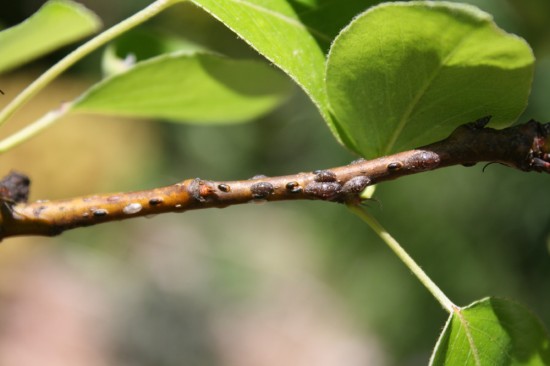Dealing with Scale Insects on Pear, Apple, and Other Fruit Trees
June 16th, 2014There doesn’t seem to be a crop out there that doesn’t have a perfectly adapted insect pest (or score thereof) to attack it.
Last year I my pear tree did not produce well. Overall it looked sickly, with yellowish leaves, smaller fruits, and black spots (sooty mold) on the leaves. I noticed small bumps on the twigs but they were hard and didn’t seem to be anything weird, maybe they were buds where future branches would grow?
In the Spring, as it was leafing out, I examined it again, and noticed these little bumps were still there, but obviously not the source of any new growth. Still hard, still not wanting to be removed, I tried harder, and with additional fingernail pressure, they came off. Bugs, insects, scales. I had heard of scale, being interested in gardening, but had never seen one or researched it. I simply knew it as the name of a pest and I knew instantly what insect this was, because, well, they were aptly named.

Scale Insects on a Pear Branch
Turns out they were likely infecting it last year too, and their secretions were responsible for the black sooty mold as well, their secretions were providing the fuel for the fungus to grow.
I had a full blown infestation on my hand, and I checked my other fruit trees, apricot, infected, apples infected, even my supposedly pest & disease free pawpaw had a few. I researched controls but couldn’t find any, obviously I had too large an infestation for natural predators to control it, if the beneficial insects hadn’t done their job by now, they wouldn’t be. Apparently in late Spring there are some sprays you can use, organic or otherwise, that can help with control. I did a lot of hand cleaning on the branches I could reach as well. Ultimately I settled on a Bayer product, Bayer Advanced Fruit, Citrus, and Vegetable Insect Control. Found at Home Depot or Amazon.com through the link. This is a systemic insecticide, meaning it works, well, like people medicine works, like antibiotics work. You water it into the tree, it gets inside the tree, and the insects who suck from the tree then ingest it, and die. Normally you don’t want to use systemic products on edibles, but this was specifically formulated for fruit trees.
It isn’t organic, but I’m not a zealot, if I thought releasing 100 ladybugs into the tree would have fixed the problem I would have tried that, but I couldn’t find any really good solution to the infestation outside of “deal with it” or “try spraying an oil on the tree a year from now and you’ll get [i]some[/i] benefit.” So I reached for the big guns, and considering I can’t really reach the highest points on these trees, more or less my only option. So far so good, but I’ll update this post after more time has passed.

June 17th, 2014 at 6:30 pm
Does that product harm bees? I am not so much an organic zealot as a bee zealot. I feel i have very good reasons for this. Check , if you would, if it harms bees. No bees, no fruit. 🙁
Thanks
June 19th, 2014 at 5:39 pm
I do not believe it harms bees (unless the bees try to suck on the tree’s sap), in anycase I only used it to treat the tree after it was done blossoming. I wouldn’t use any spray or other sort of treatment, organic, synthetic, or otherwise, when a tree is in bloom.
July 7th, 2014 at 9:31 pm
Best thing that is natural is home made white oil. Mix up oil (I use whatever I have inc olive, canola etc) and a tablespoon of detergent. Shake it up and it goes white – hence the name, spray away and you’ll be right.
It works by blocking the pores of the scale and they can’t breathe. Sounds horrendous I know. Give it a few days and give it a good spray with the hose.
Cheers
December 15th, 2014 at 8:43 pm
Whatever you do, read the label looking for sulfur in the spray. Do not use any kind of sulfur containing product on apricots. It kills them dead (actually they usually bloom first, then die). voice of experience. The label will tell you not to use it on apricots. Who reads that little print?
May 13th, 2017 at 11:19 am
It’s been 3 years, what’s the update?
May 19th, 2017 at 12:56 am
I’d love to hear an update. I work at a nursery organically managing the edibles and indoor. I’ve struggled for an organic option to remove scale from sweet bay and citrus. Any thoughts? I was hesitant to use imidichlophrid due to it being toxic even among synthetics. thanks for any news.